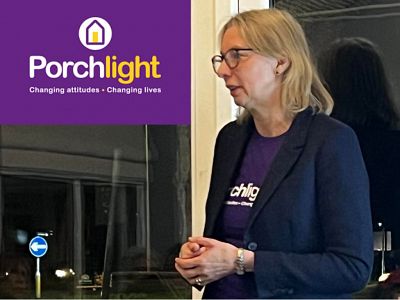“What if you had to leave your home in a hurry … what would you take? This was the question that Helen Langworthy started with when she came to speak to us about Kent’s leading homelessness charity, Porchlight.
Porchlight works across Kent, Medway and Bexley to help homeless and vulnerable people get support with their housing, mental health, physical health, wellbeing, education and employment. Founded in 1974, the charity marks its 50th anniversary this year. Last year alone they supported over 7500 people across Kent. We have supported the charity’s work from time-to-time (e.g. here) and this year it’s our President’s chosen charity – which means proceeds such as those from “Sailor Ted” will support its work.
Helen is a patron of the charity. Her opening question was an excellent way to get us to think about what it might feel like to suddenly find ourselves homeless - what things are most important to us? What would we take with us? Papers? Photo albums? Blankets? Passports? These were just a few of the suggestions shouted out from the audience.
Picking up on the last suggestion, Helen highlighted how ID is indeed really important to homeless people. Yet for those who sleep on the streets, looking after such items can be a big effort. She gave the example of one of their clients that sleeps with his ID stuffed into his boots which he tucks under his head for safe-keeping when he’s sleeping.
The anecdote emphasizes how security is a major challenge for homeless individuals - especially for street sleepers. Recent news has highlighted some of the real struggles and stigma associated with homelessness. Not only do street sleepers have to live under difficult conditions in rain and cold weather, but they may suffer harassment, abuse and crime.
But, as Helen made clear, homelessness doesn’t always mean street sleeping - for instance many homeless people are “sofa surfing”, temporarily staying at someone’s house. For most homeless people, something has happened to them which means they can no longer live in their own home. This can include a relationship breakdown, losing their job, or difficulty in coping due to poor mental health. For some people, this could mean they still have a job and continue working, but are also homeless and don’t have a permanent place to call home.
Porchlight is fighting for a safe home, better life and fairer future for everyone. It’s doing this by:
- drawing on decades of experience to help people facing poverty, and inequality in health and housing;
- creating a safety net so everyone can find the support that’s right for them;
- helping people to see their strengths and connect with others to build the future they want;
- working to improve understanding of the issues people face and solutions that can rebalance an unfair system.
Although Porchlight marks its 50th year, Helen points out that this milestone is not really something to “celebrate”. They would much prefer a world in which they weren’t needed.
With pictures from the 1970s (including one of her as a cute baby), Helen reminded us how many things have changed since 1974 when Porchlight was founded – from fashion to technology. But, sadly, homelessness remains a real problem. The life expectancy for an average person has risen from 72 to 81 years – but, alarmingly, a 2022 report states the life expectancy of a homeless man is only 46 and that of a homeless woman is 42 years. It’s a “stark reminder,” said Helen.
So, what do they do at Porchlight? Helen showed us a slide summarising their services:
- Street outreach for people experiencing homelessness
- Homelessness accommodation where people can rebuild their lives
- Work, health and learning activities that allow people to gain new skills and set new goals
- Supporting young people with their mental health and providing safe, supportive spaces for those who identify as LGBTQ+
- Supporting adults with their mental health.
Ideally, Porchlight wants to keep people in their homes - but if they are unable to do so they want to help clients to get back on their feet as soon as possible.
Helen volunteers at Porchlight Open Door hubs (PODs): places that anyone aged 18+ can go to enjoy a meal, socialise and get advice for any issues they are facing. Helen says they remind her of what local churches or communities used to do. Many activities take place at PODs. For example, people are taught to cook (a lot of men, we were told, have never learned to cook). Volunteers like Helen also do a lot of work with young people, especially around mental health.
An interesting slide summarised more ways in which Porchlight is making a difference. For example, last year they supported 269 people who are rough sleeping in Kent; they prevented 99% of the people they support in the community from losing their home; they supported over 3000 people in the most disadvantaged areas of the country; they prevented 21 rough sleepers from being discharged from hospital back onto the streets and, finally, they helped 193 young people dealing with mental health conditions. In 2023 Porchlight received a Homeless Link Excellence award for “outstanding achievement in outreach and rough sleeper provision”.
Helen gave us some examples of situations face by their clients. One person struggled with social stigma: they’d suffered brain damage due to childhood abuse that resulted in them shaking. However, when people see him they assume they are high from drugs – which means the client can be turned away from places. Another rough sleeper with pneumonia was discharged from hospital back to street when better. In both instances Porchlight gave support.
Helen first got involved 15 years ago through her children’s school. After a personal tragedy two years ago, her family decided to support Porchlight with fundraising – for example, Helen has organised and taken part in a sponsored cycle ride (“Pedalling for Polly”) with friends and colleagues. They cycled 150 miles and raised an astounding £65k in total between 35 of them!
Next, Helen showed some photos of some of Porchlight’s clients and helpers – putting names to faces and hearing each person’s story really brought home the value of the charity’s work and the commitment of its staff and volunteers. One young man, for instance, had had a difficult upbringing. His homelessness was a result of teenage trauma. Sadly, both of his parents had died by the time he was 17 and he turned to unhealthy coping mechanisms, leading to homelessness; he eventually became a street sleeper. Helen told us how, one night, he’d fallen asleep and woken up covered in snow. He’d gone to a local fast-food place to buy a warm drink but they wouldn’t let him in as he was a rough sleeper. He was helped by Porchlight – but it took three attempts by the charity to get him fully off the street. “Like many homeless people, he felt he wasn’t worth it,” said Helen. Now, remarkably, he works at Porchlight. “He knows what it feels like and can talk to clients in a way that someone without that experience can’t”.
Helen’s final slide focused on how members of the Rotary Club can help Porchlight. She listed some of the many upcoming fundraising activities: a 1970’s quiz, the CEO sleepout, golf days and even “Paws 4 Porchlight” in which people walk every day with their dog and are sponsored. “The dog gets a very natty bandana too,” laughed Helen. Of course, people can also volunteer. But even if they can’t do that, they can help to spread the word about Porchlight and also raise awareness of homelessness. You can find out more about Porchlight's fundraising events here.
If you know of an organization that would like to have a presentation from Porchlight, you can contact them by email at: getinvolved@porchlight.org.uk
At the end of Helen’s talk PP Tim Brett thanked her on our behalf; he also reminded us all of the connection between our own Rotary Club and Porchlight at its outset.
To find out more about Porchlight, visit the website here.
Picture: Helen speaks to our members at the Victoria Hotel. Picture credit: Rotary Club of Canterbury.



